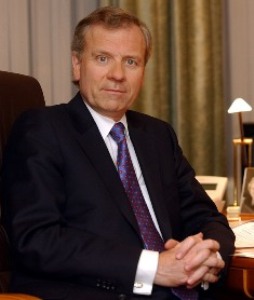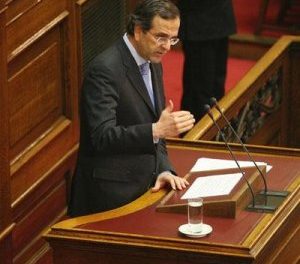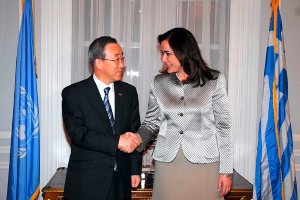Ladies and Gentlemen,
Dear friends,
Let me start by thanking Rector Georgi Khubua for his kind words of introduction. I have very fond memories of my previous visits to Tbilisi University, and I have been looking forward to coming back.
There was, of course, every reason for me to come back. When I was here last, in October of 2007, less than a year ago, no one could have predicted the dramatic events that have recently unfolded in this country. I have come back to Tbilisi this week, together with the members of the North Atlantic Council, NATO's most senior political body, to demonstrate the Alliance's strong support for Georgia – and for the democratic choices which Georgia has made, and will continue to make.
A lot has been said and written about NATO these last few weeks in connection with the crisis in your country. Regrettably, many of those observations have been based on quite serious misunderstandings of what the Alliance is about, and how it functions. And so I appreciate this opportunity to talk to you about NATO, our response to the recent events here, and the evolving relationship between Georgia and the Alliance .
NATO has stood by Georgia in the recent crisis, and we will continue to do so. We have given our full backing to the robust diplomacy of President Sarkozy in his capacity of the EU Presidency and the EU, and strong backing to the six-principle agreement signed by the Georgian and Russian Presidents. We have urged – and continue to urge – its rapid and complete implementation. NATO has also reiterated – in no uncertain terms – the importance of full respect for Georgia's sovereignty and territorial integrity – and of finding negotiated, peaceful solutions to the conflicts in this region, instead of taking unilateral action. Our continued support for Georgia is clear in the NATO-Georgia Joint Statement that we have issued on the occasion of this visit.
Moreover, we have not only condemned Russia's decision to extend recognition to the South Ossetia and Abkhazia regions of Georgia, but also called upon Moscow to reverse that decision. Because it is a wrong decision. We have made clear to Russia that we can not continue with "business as usual" – in our relations with Russia and so we have started a review of our cooperation. And we have strongly refuted any suggestion by the Russian Government that NATO should somehow choose between Russia and Georgia.
NATO will continue to stand by Georgia – but neither will we close our doors to Russia. That would not be the right thing to do, nor would it be in our interest. Russia is a reality that we cannot ignore – and do not want to ignore. Nor are we in the business of punishing Russia. As a matter of fact, looking at the international isolation that Russia has got itself into, Russia is really punishing itself. Not only NATO, but also the European Union, have criticised Moscow. Russia did not get the support it wanted from the Shanghai Cooperation Organisation – in which it is a member. And the Russian economy has already felt the impact of last month's events: just look at the decline of the Russian stock market for evidence of that.
No, punishing Russia is not the way forward. The way forward really is to help Georgia. Your country is located where it is – it cannot pack up and move to a quieter part of the world. Ultimately, Georgia and Russia will have to co-exist. But this will only work if Georgia is sufficiently confident, stable and secure – and seen as such by all its neighbours. And we in NATO want to help Georgia move forward again in that direction.
In the wake of the "Rose Revolution" of 2003, this country has set out on a bold reform course. Over the past few years, with NATO's encouragement and assistance,
Georgia has made remarkable progress in democratic, judicial, economic and defence reform: even if I must be frank and say that there is more that Georgia must still do to meet NATO's democratic standards fully. Let me mention in this connection the organisation and conduct of elections, an independent, unbiased media, and a mature, constructive dialogue between government and opposition So while I salute Georgia's remarkable progress, I want to see this effort continuing.
That said, Georgia has also clearly demonstrated that it wants to be a provider of security, and not a mere consumer. It has contributed forces to international stabilisation missions, including the NATO-led operations in Kosovo and Afghanistan.
NATO greatly appreciates Georgia's willingness to share these burdens with us.
Today, there is a strong consensus among the NATO Allies that we should continue to intensify our political dialogue with Georgia, to extend our practical cooperation, and to further deepen our relationship. Our key priority at this moment is to assist Georgia in relieving the humanitarian crisis and recovering from the destruction that was caused last month. We have begun to provide concrete assistance in repairing transportation and communication links and to ensure the safety of air traffic. We have sent NATO teams to Georgia in the areas of civil emergency planning and defence reform to assess your needs and help channel assistance effectively. We are pushing ahead with our Trust Fund to help you destroy dangerous munitions and also to help Georgia with de-mining. Allies have provided assistance to Georgia to protect your computer systems against cyber attacks. I cite these examples to demonstrate that we will help you not just in words but in deeds as well; particularly in helping this country to recover as quickly as possible from the immediate crisis. But we are obviously keen to get our longer-term cooperation back on track as soon as possible as well.
Of course, the Georgian Government has made it very clear for some time that it wishes not just to cooperate with NATO, but for Georgia to become a member of the Alliance sooner rather than later. At their last Summit in Bucharest in April, NATO Heads of State and Government recognised Georgia's Euro-Atlantic aspirations, and agreed that it will become a member of NATO eventually. In the wake of last month's crisis, we proposed the creation of a NATO-Georgia Commission to help to guide and expand our cooperation and to supervise the process that was set in train in Bucharest. We held a very successful first meeting of that Commission here in Tbilisi yesterday. It is not only a clear demonstration of NATO's political commitment to Georgia, but also a major vehicle for Georgia to enhance its cooperation, and move closer towards the Alliance.
I say again what I said here last October: The process of NATO enlargement will continue, with due caution, but also with a clear purpose – to help create a stable, undivided Europe, in which democratically-elected governments are free to make domestic and foreign policy choices that they believe to be in the interest of their countries, and their citizens. No other country will have a veto over that process, nor will we allow our strong ties to Georgia to be broken by outside military intervention, and pressures. Georgia has a rightful place in this Europe. It has already made great strides to occupy that place. And while the events of last month may have been a setback, the road to NATO is still wide open for Georgia.
Now some of you may feel that road is very long, and wonder how long it will still take for Georgia to be admitted into NATO. In this context, it is important to understand that NATO operates by consensus. Since the Alliance is made up of sovereign, democratic nations — with no single nation laying down the law as was the case with the Warsaw Pact — this has sometimes led to difficult debates. But on the other hand, NATO has drawn considerable strength from the very process of consensus-building among its member nations. The efficiency of the Alliance's decision-making was never really affected, even when it grew from 16 to 26 member nations. And NATO's unanimous decisions have always carried more political weight than any majority decisions could have ever had.
It is no secret that, at the moment, while all 26 NATO Allies agree that Georgia will one day be a member of the Alliance, there are different views on how fast Georgia should be admitted into our Membership Action Plan, which will help it to intensify its preparations. The Allies have agreed that Foreign Ministers will make a first assessment of Georgia's application for the MAP – as well as that of Ukraine – when they meet again in Brussels in December. I sincerely believe that – by continuing on the reform course, acting responsibly, working with international institutions, pursuing the peaceful resolution of conflicts, and contributing to security both at home and abroad – Georgia will be able to foster greater consensus among the NATO Allies on the timing of its entry into MAP and its eventual membership in NATO. While the final decision will always rest with the NATO Allies, there is much that Georgia can and should do to influence that decision. In this respect, let me be clear: Georgia has suffered a major shock; but the way to respond is not to stop your democratic reforms or to engage in a polarized stand-off between government and opposition. That might be the easy course but it would be the wrong course. The way ahead for Georgia – for its security and increased engagement with its Western partners – is to push ahead with reform and to improve further its democratic institutions and practices. When others are acting irresponsibly, Georgia must be a predictable, responsible partner.
Ladies and Gentlemen,
Dear friends,
NATO has stood by the Georgian people, and it will continue to do so – by offering support and encouragement for the democratic choices you have made and will continue to make. I would ask you, as members of a generation that has the most to gain from the path of democracy, reform and integration, to play your full part in advancing this process.
Five years ago, the "Rose Revolution" was a strong affirmation of the right of the Georgian people to choose their own leaders, and to plan their own future. It is up to you to keep that spirit alive, and to carry the flame of freedom and democracy forward. The future of Georgia truly is in your hands.
Thank you.



















